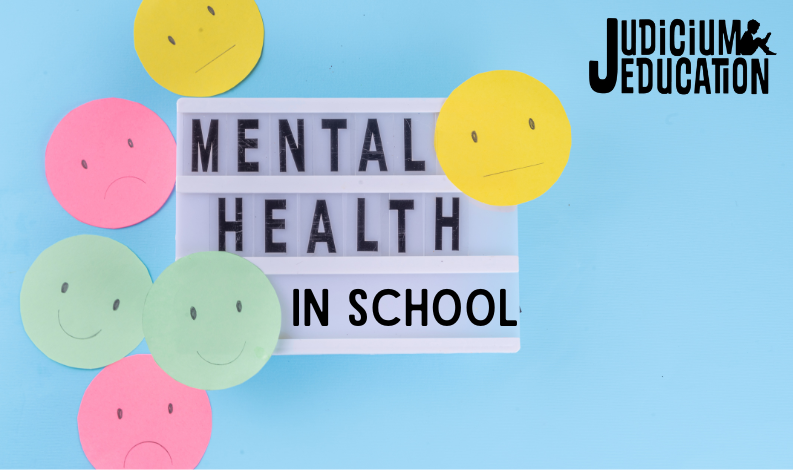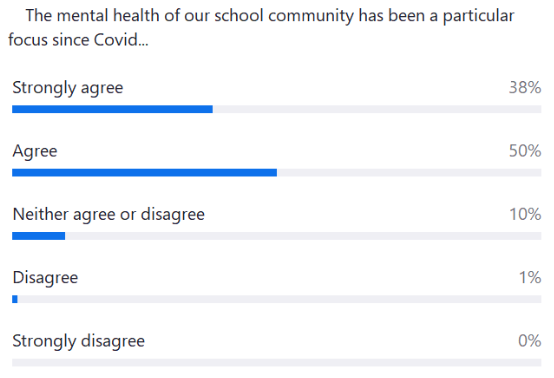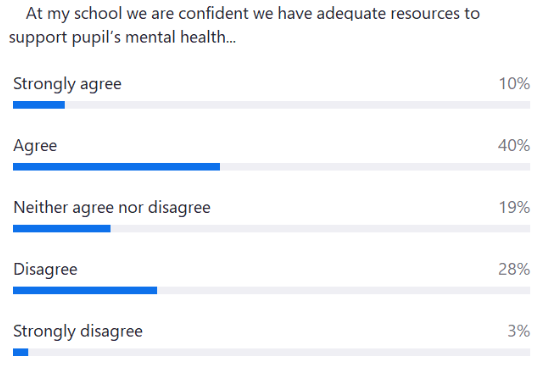Safeguarding, SEND and HR: Supporting the Mental Health of Everyone Within School

This blog is based on Judicium’s Safeguarding and HR ‘Sofa Session’ from the 9th of October, with our resident experts Helen King and Jenny Salero. This session focused on supporting staff to understand the importance of mental health, safeguarding pupils with mental health concerns, and our top tips to support the mental health of your staff.
Poll 1
Mental Health in Schools
Mental health has been on the agenda of schools for several years now, with the first mentions of senior health leads in schools coming into conversation pre-2020 and the Covid pandemic.
Since then, it has been brought into even starker focus.
Current research suggests that 50% of all mental health problems start by the age of 14, nearly 40% of 6 to 16 year olds have experienced deterioration in mental health since 2017.
Judicium’s work with schools and trusts takes careful consideration of pupils who are severely absent due to attendance concerns, following with support to the DSL to understand what the next steps for this group could be. One theme we continuously see is that DSLs and attendance leads find resourcing to be a particular barrier. Our work with schools and trusts helps them understand how they can navigate this challenge.
Poll 2
Effectively Supporting Staff to Understand the Importance of Mental Health
Supporting pupils when resources are limited can be challenging, but there are steps you can take. As a DSL, particularly in secondary schools, the most logged concern is often mental health, with a rise in self-harm incidents in recent years. Initial training often covers attachment issues and trauma-informed practice, but as staff face these challenges first-hand, we must train them to respond in real time, especially in crises. In light of this some schools and MATs have created protocols with their Mental Health Support Team to guide teachers in responding to self-harm and suicidal ideation.
TIP: Consider what mental health concerns are common at your school or MAT and equip teachers accordingly. Local or online training, like MindEd’s free resources, can be invaluable.
Referring Safeguarding Concerns
DSLs often report that staff lack confidence in addressing safeguarding concerns, simply logging issues without checking in with the child. Incidents like "Child X looked down today" or "Child Y was teary" result in the safeguarding team spending time investigating vague concerns. Some DSLs feel staff are so worried about making mistakes, they pass issues on without asking follow-up TED questions (tell me, explain to me, describe).
Training staff to use these techniques can promote a whole-school approach, supports wellbeing and eases pressure on the safeguarding team. Scenario-based training around disclosures and record-keeping is key to this.
Poll 3
.png)
Recommendations
Its important staff know what resources are available to pupils, both free and within the school, and to understand how these resources work rather than simply signposting them. This allows staff to discuss them confidently and encourage pupils to use them.
While concerns about a child in crisis should always be reported to the DSL, regular messaging about available support may help those less likely to come forward.
Map out your school's wellbeing support, which might include interventions like Lego therapy, play therapy, or counselling. Make sure staff understand these resources as part of early help and know how to refer pupils.
The Thrive Approach, a trauma-informed, whole-school programme, is another option to explore. It offers DfE-accredited training and supports mental health and wellbeing in both mainstream and special school settings.
Pupils with SEND
The Children's Commissioner Report on SEND found children with SEND are more likely to struggle with managing their mental health and often don't have someone to talk to when worried.
Those who receive timely support in school are happier, highlighting the importance of addressing the delays in accessing support for SEND pupils. At Judicium, our bespoke SEND Support service helps schools and trusts meet the needs of SEND pupils by supporting the SENDCO in early identification and intervention.
NB: In November, we are hosting live sessions every Thursday at 3:45, focusing on early identification and support for speech and language needs, emotional-based school avoidance, autism, and ADHD. These sessions will benefit DSLs who collaborate closely with the SENDCO to address the safeguarding needs of SEND pupils.
Supporting the wellbeing of DSLs is critical, as the role is prone to burnout. Judicium champions safeguarding supervision, a fast-growing service advised in Working Together to Safeguard Children. Supervision provides DSLs and their teams with protected time to review and reflect on cases, building resilience and improving safeguarding practice.
Key Tips to Help Support the Wider Mental Health of all Staff
An area which has remained a constant challenge for schools and trusts is difficulty regarding supporting staff and managing staff attendance. We've also seen a significant increase in absences related to mental ill health in recent years, particularly since the pandemic.
Proactive steps to try to avoid absences
1. Utilise managers to spot early signs of mental ill health
Depending on your setting and your size it may not be possible for members of SLT to know all staff well, or well enough to spot early signs of a problem such as someone who's not quite feeling themselves. However, it is something line managers should be able to do.
Line managers should be chatting to staff regularly, having contact with their team members every day and should be able to spot any initial signs of mental ill health.
This could include:- Tearfulness
- Withdrawal from the rest of the team or social situations
- Changes in behaviour
- Unexpected drop in performance or engagement in the workplace
This list isn't exhaustive, and on some occasions, there may not be any indications of mental ill health before somebody is absent from the workplace. However, you can train your line managers, middle leaders and senior leaders to look for signs of mental ill health, to understand what wellbeing is and how they can support their teams. It may be something that can be addressed early, even before an absence occurs.
It won't always be possible or feasible to prevent an absence from a member of staff. However, if signs are spotted early, a line manager, member of SLT or another colleague who works closely with that individual, may be able to speak to that member of staff about what's going on, how they're feeling and whether there's anything they need. By opening those types of conversations, you as an employer can provide support to the individual member of staff when they've been concerned or worried about reaching out previously and prevent or reduce the number of absences moving forward.
At Judicium we have seen this work successfully for clients, particularly when work related stress is the cause of the concern for the member of staff.
2. Regularly highlight the support available to your staff
Make sure you highlight to all staff the support that's available to them.
Many of the schools and trusts we work with have lots of excellent support in place for their staff, including:- Mental health first aiders
- Employee assistance programmes
- Counselling services
- Access to a range of therapies
Often these are only flagged or highlighted to staff once they are absent, have been signed off or have been seen by occupational health.
By the time the person is signed off and it can be then difficult to get the person to engage in coming back into the workplace. This can be due to a combination of factors including the generous sick pay terms and conditions offered to many staff within an education setting. Also the barriers which can arise when somebody is signed off with mental ill health can affect this along with the hurdles a return to work presents for them whilst they are recovering.
Ensure you regularly remind staff of the support you have, where it is and how it can be accessed. Posters, notices and reminders are great and it's important to keep the message available to all staff. If staff don't know, in situations where there are concerns about their health they might be nervous to ask so remind them as often as you can in as many different formats as you can (posters, staff briefings e-mail newsletters, e-mail signatures, etc) of what's available.
We work very closely Smart Clinic, an Education specific OH service provider. The service is designed to support schools and trusts to optimise employee health, attendance and wellbeing. This includes establishing each individual employee’s fitness for work, helping to manage employee absence, supporting return to work strategies, advising on necessary adjustments, ill health retirement, and assisting in promoting general health and wellbeing of the workforce. Staff can get up to Six sessions of Counselling or CBT per employee
3. Don’t be afraid to make contact
Don't be afraid to make contact with a member of staff in the event they are absent and/or signed off as unfit for work.
At Judicium we often receive queries from clients regarding this and there is a common misconception that if someone is signed off as unfit for work, they cannot be contacted at all. This is not the case and often not having contact with anyone can make the absences worse or create a barrier to returning and subsequently making a return to work more challenging.
If you do have a colleague who is absent from work or is signed off as unfit for a period of time, for any reason, including mental ill health, we recommend you reach out to them early on. Avoid thoughts like, ‘Oh they have a fit note for three weeks they'll be back in a couple of weeks’ time, so I'll see them then.’ This may not be the case as it’s common for fit notes to rollover repeatedly before realising a member of staff has been absent for half a term.
If you receive a fit note from a member of staff, ensure somebody reaches out to them for a welfare call. Where the colleague is absent due to mental ill health think carefully about who is best placed to have that conversation and to open the door to a dialogue with them. This might be a member of SLT, their line manager or a member of the HR team.
When you contact that colleague, if they say, ‘I'm not ready to speak, I need some space,’ as an employer you need to respect it and arrange a further touchpoint in the future. We suggest in a few weeks’ time or closer to the expiry of the fit note. You may need to start thinking about attendance management, absence management and adjustments which can be made to support people back into the workplace. NB: This is very difficult if there hasn't been any contact with the member of staff for a few months or longer.
Take that first step as soon as you can.
You can follow us on Twitter: @JudiciumSG @JudiciumEDU
Safeguarding eLearning Courses
Employment Law and HR Live Courses
The Safeguarding Team can also deliver bespoke, onsite training at your school. Prices start from £495+VAT for 2 hours covering one of the following: Governor training, Safer Recruitment, DSL or All Staff.
If you’d like to review Judicium’s forthcoming sofa sessions please click here
© This content is the exclusive property of Judicium Education. The works are intended to provide an overview of the sofa session you attend and/or to be a learning aid to assist you and your school. However, any redistribution or reproduction of part or all of the contents in any form is prohibited. You may not, except with our express written permission, distribute or exploit the content. Failure to follow this guidance may result in Judicium either preventing you with access to our sessions and/or follow up content.
Related content
.png)
This is a summary from Judicium’s Safeguarding and Thrive ‘Sofa Session’ from 3rd December, with our Judicium Safeguarding consultant Joanne Bocko, Thrive Head of Innovation and Principal Trainer, Viv Trask-Hall and Director of Thrive, Tom Preston. Drawing on decades of combined experience in safeguarding, governance, SEND, leadership, and mental health, the panel unpacked how the framework’s shifts will impact schools, what Ofsted will be looking for, and how leaders can position themselves for success.

This is a summary taken from Judicium’s SEND and Safeguarding ‘Sofa Session’ from 5th November, with our Safeguarding and SEND consultants Rik Chilvers and Simon Hanley. In this session we discuss the new SEND and Safeguarding toolkit and how to best prepare for an Ofsted visit.
.png)
This blog is based on Judicium’s Safeguarding Client Survey Uncovered - Insights from the sofa session from 8th October with our Safeguarding Consultant Joanne Bocko.
.png)
This blog is based on Judicium’s Safeguarding - Back to school: Are you KCSIE ready? sofa session from 10th September with our Head of safeguarding, Kate Massey . In this session we take a look at the key updates for KCSIE 2025, and how best to prepare for the start of the new academic year.

This blog is based on Judicium’s Safeguarding Supervision On The Sofa: Your DSLs Safe Space ‘Sofa Session’ from the 25th June 2025, with our resident experts Helen King and Sarah Cook.
).png)
Supervision is dedicated time for professionals to reflect openly on the challenges of the cases they manage. This blog explores the common misconceptions, myths and the all important benefits to Safeguarding Supervision. Don't miss our Safeguarding Sofa Session on Supervision: Your DSLs safe space on 25th June at 10am OR 11:30am.



Sofa Sessions | Safeguarding